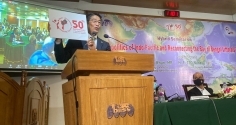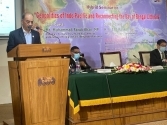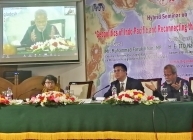Joint Hybrid Seminar On Geopolitics of Indo-Pacific and Reconnecting the Bay of Bengal Littorals
2022/2/28





Inaugural Session ( https://www.facebook.com/watch/?v=631356687968358 )
Working Session ( https://www.facebook.com/watch/?v=491075472419603 )
Working Session ( https://www.facebook.com/watch/?v=491075472419603 )
Bangladesh Institute of International and Strategic Studies (BIISS) and the Embassy of Japan in Bangladesh have jointly organized a Hybrid Seminar on “Geopolitics of Indo-Pacific and Reconnecting the Bay of Bengal Littorals” on 28 February 2022 at the BIISS auditorium as part of the celebration of the 50th anniversary of the establishment of diplomatic relations between Japan and Bangladesh. During the Inaugural Session, Mr. Muhammad Faruk Khan, MP, Hon’ble Chairman, Parliamentary Standing Committee on Ministry of Foreign Affairs, Bangladesh Parliament, graced the occasion as the chief guest. H.E. Mr ITO Naoki, Ambassador of Japan to Bangladesh, graced the occasion as the special guest. Major General Mohammad Maksudur Rahman, OSP, BSP, psc, Director General, BIISS, delivered the welcome address. Ambassador Kazi Imtiaz Hossain, paa Chairman, BIISS presided over the session and delivered the concluding remarks.
At the outset, Major General Mohammad Maksudur Rahman, OSP, BSP, psc, Director General of BIISS paid his deepest tribute to the memory of the Father of the Nation Bangabandhu Sheikh Mujibur Rahman and to all martyrs who laid their lives for both language movements in 1952 and the war of liberation in 1971, while the entire country is simultaneously celebrating the birth centenary of the Father of the nation and the golden jubilee of Bangladesh’s independence.
In his address, Major General Maksud described the importance of Indo-pacific region as the central determinant of global peace and prosperity in the near future as well as the hub of 21st century’s economic opportunities. As Bangladesh is envisioning to be a developed country in 2041, therefore, maritime resources are considered to be a major source of development and growth after the peaceful resolution of maritime disputes with India and Myanmar, He added.
General Maksud also said that, China’s Belt and Road Initiative has increased the geopolitical importance of the Indian Ocean and the Strait of Malacca as a Sea Lane of Communication. Recent great powers involvement in the Indo-Pacific region has led to geopolitical uncertainties in this region which often engendering greater concern among the littorals of the Bay of Bengal and the Indian Ocean region. Bangladesh as the gateway to South and Southeast Asia remains geographically central in the Bay of Bengal which allows it to play a pivotal role in regional and interregional trade and commercial activities.
In his remarks, H.E. Mr ITO Naoki, Ambassador of Japan to Bangladesh noted that “Bangladesh, located in the Bay of Bengal, is a vital country in geopolitical terms and it needs to utilize its geographical advantage to increase economic opportunities fully. In this regard, Japan has been developing Bangladesh's first deep-sea port in Matarbari, south of Chittagong which constitutes the "Bay of Bengal Industrial Growth Belt (so-called Big-B),". The new port and the economic zone will become hubs of "Logistics," "Power & Energy," and "Waterfront Industry" in Bangladesh and the region.
In addition, JICA is implementing several large-scale infrastructure projects under the BIG-B. For example, in December this year, Dhaka Mass Rapid Transit (MRT) Line 6 will start its commercial operation, and Bangladesh Special Economic Zone in Araihazar, the first economic zone developed by Japan will also be ready for international investment. Japan promotes various practical cooperation, including anti-terrorism, disaster prevention, and maritime safety. Japan granted 24 rescue boats to the Bangladesh Coast Guard last December and started a training program on "Coast Guard Policy" for Bangladesh Coast Guard officers".
Japan pursues a “Free and Open Indo- Pacific” (FOIP) that will ensure a rule-based international order to bring peace, stability, and prosperity for every country in the region. In this regard, Bangladesh is the country that recognize the importance of rule-based maritime order and shares its value with Japan and other like-minded countries, he added.
The Ambassador of Japan highly praises Bangladesh's efforts for sheltering the displaced Rohingyas of Myanmar. He said that Japan supports the government's relocation policy of refugees to Bhasan Char and committed to provide US $2 million as the first donor to UNHCR and WFP for their operation in Bhasan Char. He also said that we should all work towards the enabling environment for the Rohingyas early repatriation to Myanmar. He concluded by reiterating the strongest ties between Bangladesh and Japan in this auspicious occasion of the 50th anniversary of the establishment of Bangladesh-Japan diplomatic relationship.
In the seminar, Hon’ble Chief Guest H.E. Mr. Muhammad Faruk Khan, MP, said that, the term “Indo-Pacific” received much currency when the Japanese Prime Minister Shinzo Abe described it as the “Confluence of the two seas” in 2007. Mr. Faruk Khan expressed his expectation that counties such as Japan can play a more active role in ensuring peace and stability in this region as japan is a forerunner of the concept of “Free and Open Indo-Pacific”.
Mr. Faruk Khan strongly believed that Bangladesh and other littorals of the Bay of Bengal want to cooperate than to antagonize each other. Besides, he mentioned about the forcibly displaced Rohingyas that may increase security threats in the Indo Pacific region. To resolve the Rohingya Crisis, our Prime Minister Sheikh Hasina also sought support from Japan’s current Prime Minister Fumio Kishida for the peaceful repatriation of Rohingyas to their homeland- Myanmar, He added.
In his concluding remarks, Ambassador Kazi Imtiaz Hossain, Chairman of BIISS noted that, the discussion in the Seminar has led the way for further insights into the geopolitical shifts in the region. He expressed this concern about the non-traditional security issues in the region including environmental crisis, terrorism, and transnational organized crimes which should be kept under control. He concluded the seminar mentioning Bangabandu’s diplomacy of “Friendship to all, Malice to none” that has been the motto of Bangladesh foreign policy. And with regard to the fifty years of Bangladesh-Japan relations, he wished strongest ties between the two countries to achieve greater prosperity and economic cooperation.
In the working session, amongst the speakers, Professor Imtiaz Ahmed, Department of International Relations, University of Dhaka, presented on “The changing Nature of Geopolitics: Making sense of Bangladesh’s Position”, Professor KIKUCHI Tsutomu, Professor of International Political Economy, Aoyama Gakuin University, Japan, made a presentation on “Beyond US-China Relations: Japan’s Strategic Vision for the Indo-Pacific“, Professor Lailufar Yasmin, Department of International Relations, University of Dhaka deliberated on “The Rise of the Indo-Pacific: Bangladesh-Japan Relations”, and Professor TAKAHARA Akio, Professor of Graduate School of Public Policy, The University of Tokyo, presented on “FOIP and Maritime Cooperation: Japan’s Initiative”. The working session was moderated by Professor Rashed Uz Zaman, Department of International Relations, University of Dhaka.
Professor Imtiaz Ahmed said that it is the humans who create geopolitics and as long as a region has resources, it will attract attention. He highlighted that Bangladesh has done tremendously well in terms of both economic and human developments after the independence. He also highlighted Bangladesh's unique feature in terms of being a people's republic, having a liberation war and a foreign policy that is amicable towards all. He also talked about Bangladesh's position in the geopolitical race in Indo- Pacific and noted that Bangladesh has no enemy.
Professor KIKUCHI Tsutomu, Professor of International Political Economy, Aoyama Gakuin University, & Adjunct Senior fellow, Japan Institute of International Affairs (JIIA), said that Japan had been pursuing to implement its “Free and Open Indo-Pacific (FOIP) strategy for a rule-based international order. Japan is pursuing three pillars to establish rule-based order in this region: strengthening the alliance with the US; moving Southward to construct networks with new alignments (bilateral, trilateral, quadrilateral, and regional) with the countries and institutions in the Indo-Pacific; and constructive engagement with China. He also expressed that Bangladesh, which is located on the strategic trade route of the Indo-Pacific, is a very important country for the realization of Japan's Indo-Pacific vision.
Professor Lailufer Yasmin noted that Japan is one of the countries to recognize Bangladesh soon after its independence. Bilateral relations between the two countries is marked by several high-level visits. Japan is one of the countries which extended cooperation to Bangladesh in its early days of Independence which helped the country to survive amidst different odds. She added that Bangladesh’s economy is growing successfully with an awe. The country is changing its status from being victim to geography to blessed by geography and becoming an emerging middle power
Professor TAKAHARA Akio highlighted that there are three pillars to uphold FOIP- commitment for peace and stability, promotion and establishment of the rule of law, freedom of navigation, free trade, and Pursuit of economic prosperity. He also mentioned that JICA is cooperating in maritime safety and security through different training programs, grant aid, and ODA loans etc. He also argued that FOIP is not for countering BRI, rather they can be compatible. FOIP and BRI can coexist in economic aspects rather than in strategic aspects. He expressed that Bangladesh could help implement projects in areas where FOIP and BRI can be connected.
The moderator of the session Professor Rashed Uz Zaman said that there are geopolitical uncertainties in the Indo- Pacific that need to be addressed, and all the littorals should focus on the possibilities and opportunities of a connected Indo-Pacific region.
Senior officials from different ministries of government, ambassadors and high commissioners, former diplomats, senior military officials, media, academia, researchers, teachers and students from different universities, representatives from different international organizations, participated in the Seminar and presented their valuable opinions in the open discussion session.
